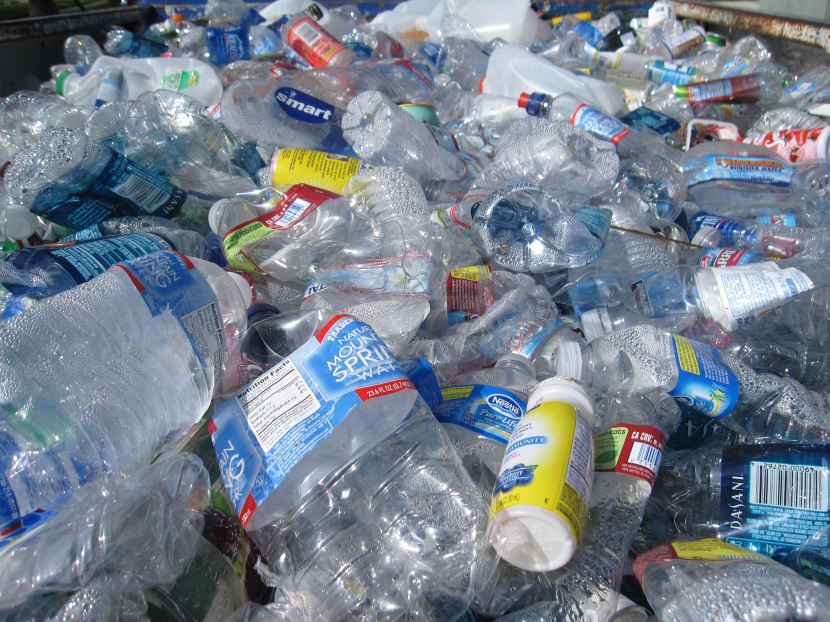Explainer: Why Singapore’s plastic recycling rate is so low and what can be done to raise it
SINGAPORE — A week ago, the National Environment Agency (NEA) launched a study looking at whether Singapore should have its first recycling facility dedicated to only plastic bottles in an effort to boost plastic recycling rates here.

In Singapore, the recycling rate for plastic bottles is at 4 per cent — the lowest here among other waste streams such as metal and paper.
- At 4 per cent, Singapore’s plastic recycling rate is the lowest compared to other waste streams
- A study is underway on whether Singapore should have a recycling facility for plastic bottles
- Aside from infrastructure, experts said public education is still lacking on how to recycle plastic and what plastic can be recycled
- However, they said reducing plastic consumption is still the best answer to tackling plastic waste
SINGAPORE — A week ago, the Plastics Recycling Association of Singapore launched a study looking at whether Singapore should have its first recycling facility dedicated to only plastic bottles in an effort to boost plastic recycling rates here.
Right now, the recycling rate for plastics is at 4 per cent — the lowest here among other waste streams such as metal and paper.
The idea to have a dedicated recycling facility for plastic bottles was also mooted by the association.
The association, which was launched last Tuesday (Aug 17), aims to raise the recycling rate of plastic waste to 30 per cent in the next five years, and then up to 70 per cent in the next 10 years.
Along with building the polyethylene terephthalate (PET) bottle-to-bottle recycling plant, it seeks to do so by setting up a Plastics Recycling Centre of Excellence, which will develop recycling solutions for the region.
Experts whom TODAY spoke to agreed that Singapore lacks the proper infrastructure to recycle plastics here, and this is one of the reasons the recycling rate for plastics remains low.
But there are other reasons that contribute to the low figures, they said, including the lack of knowledge among consumers on what plastics can be recycled and how to recycle them properly.
TODAY takes a closer look at why the current rate for plastic recycling here is so low and what else can be done to push this figure up.
LACK OF KNOWLEDGE AMONG CONSUMERS
One reason the rate of recycling for plastics is low is that many consumers are not aware that there are many different types of plastics, and not all of them can be recycled, experts told TODAY.
And even if they are aware, some of the plastics still get thrown away, rather than recycled, because consumers do not know how to recycle them properly, they added.
Ms Jen Teo, executive director at the Singapore Environment Council (SEC), referred to a report it published in 2018, which found that close to 70 per cent of Singapore residents do not fully understand what plastics can be recycled.
For instance, while PET bottles — those used to package carbonated drinks — and plastic bags can be recycled, straws, plastic disposable cutlery and styrofoam packaging cannot.
“As a result, the majority of products are disposed of as general waste rather than recycled through a circular value chain,” she said.
Then there is the issue of consumers not knowing how to recycle their plastics properly.
Ms Teo pointed out that the contamination rate for recycled waste here is high, with close to 40 per cent of the recyclables collected from the blue bins not being recycled.
For plastics, plastic packaging that has not been washed and still has food remnants on it would be considered contaminated.
With water being a scarce resource in Singapore, Ms Teo pointed out that it is rare for used plastics to be cleaned with water prior to being exported by the recycling facility, because the return on investment is not attractive.
Agreeing, Ms Pek Hai Lin, executive director of non-governmental green organisation Zero Waste SG, said that contaminated and unsorted plastic waste would often be overlooked at the sorting facility and will therefore be incinerated instead.
That is why households should sort and wash their plastic waste at home before they recycle them, she said.
“(By doing so), we're really ensuring that we minimise contamination of these materials, and this can really increase the value of that material itself and increase the chance of it being recycled.”
DIFFICULT TO RECYCLE
Associate Professor Tong Yen Wah, from the department of chemical and biomolecular engineering at the National University of Singapore, said that part of why recycling rates are so low here is because not all plastics can be and are easily recycled.
“In general, if the plastic is pure or clean, it is easily recycled. However, plastics are mostly used in ways that are in combination with non-plastic materials, or even with different types of plastics. Therefore, they have to be separated and cleaned before they can be recycled.”
For example, a PET bottle would have to be washed, have its bottle cap and even the label taken off before the body of the bottle can be easily recycled economically, Assoc Prof Tong said.
Ms Pek pointed out that not all plastics are created equal — some types of plastic packaging such as those used to wrap vegetable produce, are considered low value and have a higher chance of being contaminated.
“So unless they are very clean and provided in bulk… it really complicates the whole process of recycling,” she said.
Part of the problem is that the technology to sort mixed plastic waste and clean them is still in its infancy, Assoc Prof Tong said, and researchers are still studying and developing new technologies to do so.
Until then, many sorting systems still rely on “pure waste streams of plastic waste” — those that are clean and of a single type, for example, the plastic bottle recycling facility being studied by National Environment Agency.
“These sorting systems can work relatively well but are expensive and are very large, taking up a lot of space, in addition to requiring a large amount of manual labour,” Assoc Prof Tong said.
PLASTIC WASTE EXPORTED
Because a majority of the plastic waste here is sold and exported to buyers overseas — such as in China and Southeast Asia — how much of it is recycled also depends on decisions made by the importing countries, Ms Pek said.
For example, in 2018, China introduced a “National Sword” policy, which banned the import of most plastics and other materials.
Other countries such as Malaysia and the Philippines have since followed suit, Ms Teo of SEC noted. So, with a weak market demand for plastic waste, more of it ends up being incinerated.
The Covid-19 pandemic has exacerbated the problem as logistical disruptions have affected the recycling supply chain, Ms Pek said.
And with oil prices being intricately linked to that of recycled plastic, there is also a lack of financial incentive to develop the plastic recycling industry, Ms Teo said.
When oil prices are low, it would be cheaper for manufacturers to buy virgin plastic than it is for them to buy recycled plastic feedstock.
That is why the experts all agreed that the best solution to the plastic waste issue is still to reduce the consumption of plastics altogether.
Assoc Prof Tong said: “Another area of improvement would be to change our consumption mindset from the current ‘disposable products’ to one that would encourage the use of materials more than once, especially plastic packaging, food-related products like utensils or containers, and plastic bags.
“This is mainly because these plastics are not easily recycled, or it is not economical to recycle them even if they can be recycled.”











